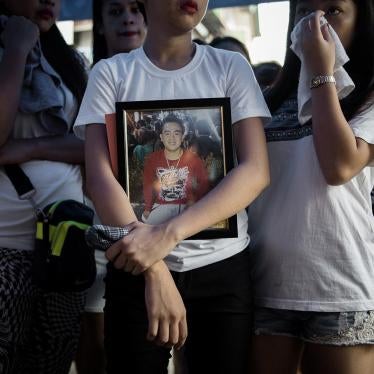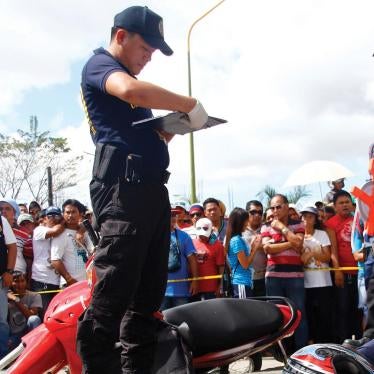Dear Prime Minister,
Ahead of your upcoming visit to the Philippines, I am writing on behalf of Human Rights Watch to share several concerns that we have regarding human rights in the country.
Given the significance of your visit to the Philippines—the first by an Australian prime minister since 2003—we urge you to use the opportunity to publicly and privately raise the following concerns with President Ferdinand Marcos Jr.
- “War on drugs”
Drug-related extrajudicial and summary killings have continued under the administration of President Marcos, even as he has said publicly that the “war on drugs” initiated by his predecessor, Rodrigo Duterte, will have a “new face” aimed at drug rehabilitation. Marcos, however, has not stopped the “drug war” and has not rescinded the executive issuances that provide wide authority to the police to conduct anti-drug raids and operations. On average, there is close to one fatality every day, with nearly 400 deaths from his first day in office through August 23, 2023.
Marcos has not made accountability for these killings a priority. Of the estimated deaths – between 6,252 (official police figures) and 30,000 (estimated by human rights groups) – only two cases have resulted in the conviction of police officers implicated in these killings. Moreover, a vast majority of the cases remain uninvestigated.
The Philippine government, including Marcos, has denounced the International Criminal Court’s investigation into possible crimes against humanity related to the “drug war” killings under Duterte and those committed by the so-called Davao Death Squad, which Duterte allegedly oversaw when previously he was mayor of Davao City. Marcos is an ally of Duterte, whose daughter serves as his vice-president
We ask that you publicly and privately:
- Urge President Marcos to make a categorical public order ending the “drug war” and rescind the issuances for it.
- Call for Philippine security forces and other officials to be held to account for their role in “drug war” abuses.
- Urge the Philippine government to impartially investigate drug-related killings both during the Duterte and Marcos administrations.
- Urge the Philippine government to cooperate with the International Criminal Court’s investigation into crimes against humanity.
- Support initiatives by civil society and human rights defenders to assist the families of “drug war” victims unable to seek redress.
- United Nations Joint Program
The United Nations Joint Program (UNJP), a technical cooperation program mandated by the UN Human Rights Council that Australia supports as a major donor, suffered initial setbacks due to the lack of cooperation by Philippine government agencies. With less than a year before it ends, the program has now started to gain some traction through its projects, among them improving the forensic investigative capabilities of government.
Human Rights Watch supports extending the UNJP but not in its current form. It should have an improved mandate to include human rights reporting and monitoring. The Office of the UN High Commissioner for Human Rights (OHCHR), in its September 2022 UNJP assessment report, laid out major human rights problems facing the country, including continued “harassment, threats, arrests, attacks, red-tagging against civil society actors, as well as the continued drug related killings by police,” compounded by very limited access to justice.
We ask that the Australian government:
- Before any extension of the UNJP, support a resolution for OHCHR to release a follow-up assessment report of the UNJP to determine its efficacy and identify areas of improvement. If UN Human Rights Council member states again do not present and adopt a resolution mandating such reporting, the Australian government should encourage the High Commissioner to take the initiative and present it under his independent global mandate.
- As one of the two biggest donors to the UNJP, press the Philippine government for definitive and tangible results from the program.
- Harassment and “red-tagging” of critics, activists, journalists and unionists
Australia has long engaged the Philippine government in counterterrorism operations in Mindanao. However, the Philippine government is misusing the country’s 2020 Anti-Terrorism Act to harass political activists, in some cases using terrorism allegations to file trumped-up charges against them in court. The act is a new tool in the government’s longstanding attempt to accuse leftists, unionists, journalists, and others of being sympathizers or allies of the communist New People’s Army. This phenomenon, known as “red-tagging,” has resulted in violent, often fatal, attacks against activists and the harassment of critics and journalists.
In addition, former senator Leila de Lima remains in police custody more than seven years after she was arrested on politically motivated charges. Nobel Peace Prize laureate and Rappler founder Maria Ressa is still facing fabricated charges.
We ask that you publicly and privately:
- Press the Philippine government to abandon “red-tagging” and other abuses against activists, critics and others and ensure that everyone can engage in peaceful freedoms and liberties.
- Urge the Philippine authorities to drop all charges against de Lima and Ressa, and release de Lima from detention.
We thank you for your consideration of these important issues, which affect millions of people in the Philippines. Please contact us if you would like further information.
Signed,
Daniela Gavshon
Australia Director
Human Rights Watch







